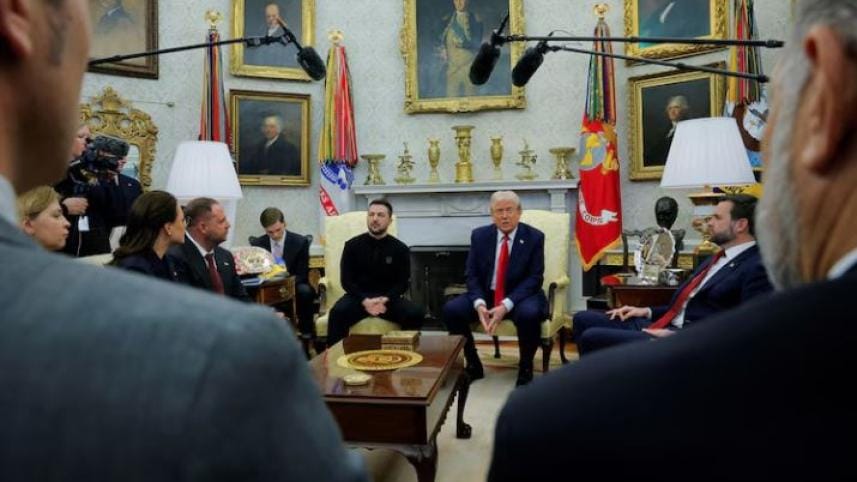Mic-drop moment in Oval Office

There was a time when world leaders were known for their policies and governance. Now, they're known for their one-liners. Once upon a respectable time, politics was a realm of great speeches, robust debates, and grand visions. Today? It's an endless stream of meme-worthy moments, savage clapbacks, and leaders who deliver zingers instead of solutions.
In the latest episode of When World Leaders Collide, Donald Trump and Volodymyr Zelenskyy sat down for what was supposed to be a diplomatic discussion that quickly turned into a masterclass in passive-aggressive exchanges. It was less of a high-stakes political meeting and more of a reality TV showdown, featuring one leader fighting for his country's survival and another fixated on optics.
Because, of course, of all the things to discuss—military aid, strategic alliances, Russia's ongoing aggression—a journalist at the meeting thought it was the perfect moment to ask, "Why don't you wear a suit?" Yes, in the middle of a conversation about a literal war, the focus shifted to Zelenskyy's attire. Because nothing says geopolitical awareness like a well-tailored blazer.
Zelenskyy's response? Iconic. "I will wear a suit when this war is finished."
Mic. Drop. Internet won.
And just like that, in one single line, he delivered a bigger statement than most politicians manage in entire speeches. Because let's be honest—what kind of question even is that? If Churchill had shown up to WWII meetings in his bathrobe, would anyone have cared? (Actually, they might have, but the man had a cigar and a war to win.)
Meanwhile, Trump—never one to let a conversation be about anything other than himself—had already managed to turn the meeting into a spectacle. Before the suit saga, he accused Zelenskyy of "gambling with World War Three." Because obviously, the leader of a country actively being invaded is the one "gambling" here. Not, say, the guy who keeps suggesting that Ukraine should just let Russia take what they want and be done with it.
It was a bizarre moment, but let's be honest—this is Trump we're talking about. This is the man who thinks diplomacy is a reality show and who once threatened nuclear war over Twitter. The idea that Ukraine should simply "negotiate" with Russia, as if Putin is a disgruntled hotel guest demanding a refund, is peak Trumpian logic.
But what makes the suit comment truly fascinating is how perfectly it encapsulates the state of modern politics. We're living in a world where aesthetics often "trump" (pun absolutely intended) actual substance. A leader can be in the middle of navigating one of the biggest conflicts of our time, and yet, what do people focus on? His outfit.
Imagine applying this same energy to other historical moments. "Mr Mandela, why didn't you wear cufflinks while dismantling apartheid?" "Mr Lincoln, that top hat is nice, but could we see you in something a little more fitted?" The absurdity of it is almost too much to process.
Zelenskyy, to his credit, handled it like a pro. He didn't roll his eyes. He didn't laugh. He didn't ask the journalist if they'd recently suffered a head injury. Instead, he gave the kind of response that reminds the world that some leaders have real priorities. He doesn't care about looking polished—he cares about winning a war.
And that, right there, is why this meeting was such a perfect display of everything wrong with how we consume politics today. While Ukraine fights for survival, the US is having its own existential crisis about whether it even wants to care. The room was less about negotiations and more about optics—Zelenskyy standing as the exhausted, battle-hardened leader trying to keep his country alive, while Trump made it clear that his main concern was how this all played for him.
At the end of the day, it's not about suits. It's about who takes this war—and by extension, democracy itself—seriously. One leader left that meeting as a man fighting for his country's existence. The other left it trying to make himself the main character.
And in the middle was this journalist who just wanted to know if Zelenskyy had considered upgrading his wardrobe.
The result? Politics is no longer about policies or governance—it's about performance. Leaders are now entertainers, their every move carefully curated for maximum virality. The more dramatic the statement, the better.
This isn't to say that politics hasn't always had its theatrics. But the difference is that now, the theatrics are the politics. We're no longer electing leaders; we're selecting the best main characters for the ongoing drama that is world affairs. And in this endless cycle of political entertainment, one thing is certain: if democracy ever collapses, at least we'll get a great headline out of it.
And what do we, the audience, do? We engage. We react. We rank presidents based on their Twitter burns and roast politicians like they're contestants on The Great British Bake Off. We consume politics the same way we consume pop culture: fast, dramatic, and with minimal emotional commitment. One day it's global conflict; the next, we've moved on to Miley Cyrus' Grammy Arms.
Barrister Noshin Nawal is an activist, feminist, and a columnist for The Daily Star. She can be reached at nawalnoshin1@gmail.com.
Views expressed in this article are the author's own.
Follow The Daily Star Opinion on Facebook for the latest opinions, commentaries and analyses by experts and professionals. To contribute your article or letter to The Daily Star Opinion, see our guidelines for submission.




 For all latest news, follow The Daily Star's Google News channel.
For all latest news, follow The Daily Star's Google News channel.
Comments